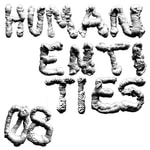Human Entities Podcast – Details, episodes & analysis
Podcast details
Technical and general information from the podcast's RSS feed.

Human Entities Podcast
CADA
Frequency: 1 episode/139d. Total Eps: 25

Organised by CADA, the programme takes place annually in Lisbon.
Listen to recordings from 2025 to 2016.
In partnership with the Lisbon Architecture Triennale and the Fine Arts Faculty, ULisbon
Funded by: The Dir.-Gen. for the Arts of the Portuguese Ministry of Culture
Recent rankings
Latest chart positions across Apple Podcasts and Spotify rankings.
Apple Podcasts
🇬🇧 Great Britain - visualArts
21/06/2025#74🇬🇧 Great Britain - visualArts
20/06/2025#46🇬🇧 Great Britain - visualArts
29/11/2024#72🇩🇪 Germany - visualArts
24/11/2024#88🇩🇪 Germany - visualArts
23/11/2024#75🇩🇪 Germany - visualArts
22/11/2024#54🇬🇧 Great Britain - visualArts
03/11/2024#57
Spotify
No recent rankings available
Shared links between episodes and podcasts
Links found in episode descriptions and other podcasts that share them.
See all- https://www.monicagagliano.com/
12 shares
- https://www.cada1.net/
8 shares
- https://www.dgartes.gov.pt/
8 shares
- https://twitter.com/j2bryson
4 shares
- https://twitter.com/MarkLeckey
3 shares
RSS feed quality and score
Technical evaluation of the podcast's RSS feed quality and structure.
See allScore global : 38%
Publication history
Monthly episode publishing history over the past years.
Human Entities 2024: Monica Gagliano
mardi 18 juin 2024 • Duration 02:19:38
Human Entities 2024: culture in the age of artificial intelligence
Eighth edition, 15 May 2024
Plant consciousness
Monica Gagliano
Evolutionary ecologist, Research Associate Professor (Adjunct) at Southern Cross University, Australia
Monica Gagliano PhD is an internationally award-winning research scientist, selected by Biohabitats as one of the 24 most Inspiring Women of Ecology, together with Jane Goodall, Rachel Carson, Sylvia Earl, and Terry Tempest Williams. She has been an invited lecturer at the most prestigious universities, including UC Berkeley, Stanford, Harvard, Dartmouth and Georgetown. Monica’s pioneering work has been widely featured by prominent media, such as The New York Times, Forbes, The New Yorker, The Guardian, National Geographic, and many others. Monica is Research Associate Professor (Adjunct) of evolutionary ecology based in Australia. She is currently Chief Scientist at Kaiāulu|Coherence Lab in Hawaii, and Research Associate at the Takiwasi Centre in Perú.
Monica has pioneered the brand-new research field of plant bioacoustics, which for the first time, experimentally demonstrates that plants emit voices and detect and respond to the sounds of their environments. Her work has extended the concept of cognition in plants. By demonstrating experimentally that learning and memory are not the exclusive province of animals, Monica has reignited the discourse of plant subjectivity, as well as ethical and legal standing. Inspired by encounters with nature and indigenous elders from around the world, Monica applies an innovative and holistic approach to science, one that is comfortable engaging at the interface between areas as diverse as ecology, physics, law, anthropology, philosophy, literature, music, the arts, and spirituality. By re-kindling a sense of wonder for the beautiful place we call home, she is helping to create a new ecology of mind that inspires the emergence of revolutionary solutions toward human interactions with the world we co-inhabit.
Monica’s studies have led her to author numerous ground-breaking scientific articles and books, including Thus Spoke the Plant (2018) and The Mind of Plants (2021).
https://www.monicagagliano.com
https://www.instagram.com/_monicagagliano_
https://en.wikipedia.org/wiki/Monica_Gagliano
https://researchportal.scu.edu.au/esploro/profile/monica_gagliano/overview
Credits
Organised by CADA in partnership with Lisbon Architecture Triennale and Faculty of Fine Arts, University of Lisbon
Programmed by Jared Hawkey/Sofia Oliveira with guest programmers: Andrea Pavoni, Justin Jaeckle, Lavínia Pereira and Olivia Bina.
Funded by: República Portuguesa – Cultura / Direção-Geral das ArtesSupport: Câmara Municipal de Lisboa; Universidade NOVA de Lisboa, Faculdade de Ciências e Tecnologia – NOVA LINCS; Instituto Ciências Sociais, Urban Transitions Hub, Universidade de Lisboa; DINAMIA’CET (ISCTE-IUL) and Faculdade Belas Artes, Universidade de Lisboa, Departamentos de Design de Comunicação e Arte Multimédia
Design: Pedro Loureiro
Photography: Joana Linda
Sound: Diogo Melo
Human Entities 2024: Jay Springett (Solarpunk)
mardi 18 juin 2024 • Duration 01:26:10
Human Entities 2024: culture in the age of artificial intelligence
Eighth edition, 5 June 2024
Solarpunk means dreaming green
Jay Springett
Strategist and writer
Solarpunk is a movement in speculative fiction, art, fashion, and activism that seeks to answer and embody the question “what does a sustainable civilization look like, and how can we get there?”
In our current age of popular dystopia, climate grief, and biosphere collapse, Solarpunk has become a ‘creative container‘ for more fertile futures. Not one future singular, but many. Solarpunk encourages everyone to re-imagine what life might be like en-route to a better world. Our collective future will not be imposed upon us from above, but instead created bottom up by individuals in polyphony. A texture consisting of multiple simultaneous lines of independent melody.
The future never passively arrives fully formed, instead, it must be dreamed. Solarpunk is one such dream. In this talk Jay will cover the story of how solarpunk came to be and its attempts at inspiring people to ‘remake our present and future history’.
Jay Springett
Jay Springett is a strategist and writer from London.
He is known as a leading voice in the speculative genre of Solarpunk, which described in 2019 as a ‘memetic engine’ – a tool to power the ‘refuturing’ of our collective imagination. In 2020 his Solarpunk short story ‘In The Storm, A Fire’ was long listed for the BSFA Award for Short Fiction. Jay is a Fellow of Royal Society of Arts in London and was selected as one of WeAreEurope’s 64 Faces of Europe in 2019. He is currently an instructor at The New Centre and speaks regularly about the future, technology and culture at events around the world. He currently hosts two podcasts: PermanentlyMoved.Online, a 301 second long personal journal and Experience.Computer, an interview show about aphantasia, creativity, and the imagination.
Jay has been writing online at http://www.thejaymo.net since 2010.
Credits
Organised by CADA in partnership with Lisbon Architecture Triennale and Faculty of Fine Arts, University of Lisbon
Programmed by Jared Hawkey/Sofia Oliveira with guest programmers: Andrea Pavoni, Justin Jaeckle, Lavínia Pereira and Olivia Bina.
Funded by: República Portuguesa – Cultura / Direção-Geral das Artes
Support: Câmara Municipal de Lisboa; Universidade NOVA de Lisboa, Faculdade de Ciências e Tecnologia – NOVA LINCS; Instituto Ciências Sociais, Urban Transitions Hub, Universidade de Lisboa; DINAMIA’CET (ISCTE-IUL) and Faculdade Belas Artes, Universidade de Lisboa, Departamentos de Design de Comunicação e Arte Multimédia
Design: Pedro Loureiro
Photography: Joana Linda
Sound: Diogo Melo
Human Entities 2022: Bram Büscher
vendredi 29 juillet 2022 • Duration 02:05:13
#NatureTruthPower: Política ambiental na era da pós-verdade e das plataformas digitais
Bram Büscher
Professor and Chair of the Sociology of Development and Change group at Wageningen University
How should we share the truth about the environmental crisis? At a moment when even the most basic facts about ecology and the climate face contestation and contempt, environmental advocates are at an impasse. Many have turned to social media and digital technologies to shift the tide. But what if their strategy is not only flawed, but dangerous?
In this presentation, Bram Büscher traces how environmental action is transformed through the political economy of digital platforms and the algorithmic feeds that have been instrumental to the rise of post-truth politics. Building on a novel account of post-truth as an expression of power under platform capitalism, he shows how environmental actors mediate between structural forms of platform power and the contingency of environmental issues in particular places. Key in understanding this mediation is a reconfiguration of the relations between nature, truth and power in the 21st century. Its upshot is the need for an environmental politics that radically reignites the art of speaking truth to power.
Bio
Bram Büscher is Professor and Chair of the Sociology of Development and Change group at Wageningen University and is a visiting professor at the Department of Geography, Environmental Management and Energy Studies at the University of Johannesburg. His research and writing revolve around the political economy of environment and development with specific interests in biodiversity, conservation, new media, digitalization and violence. He developed the concept of Nature 2.0, which focuses on the political economy of new media and its implications for participation in nature conservation. He is the author of Transforming the Frontier: Peace Parks and the Politics of Neoliberal Conservation in Southern Africa (2013), co-author, with Robert Fletcher, of The Conservation Revolution: Radical Ideas for Saving Nature Beyond the Anthropocene (2020) and author of The Truth About Nature: Environmentalism in the Era of Post-Truth Politics and Platform Capitalism (2021). This talk was followed by a Q&A session.
https://brambuscher.com
https://www.ucpress.edu/book/9780520371453/the-truth-about-nature
https://twitter.com/brambuscher
Human Entities 2021: Jennifer Gabrys
vendredi 19 novembre 2021 • Duration 59:45
Sensing Smart Forests
Jennifer Gabrys
Chair in Media, Culture and Environment in the Department of Sociology, University of Cambridge
Forests are increasingly sensorized environments. Whether in the form of camera traps to monitor organisms or the Internet of Things to detect wildfires, there are an array of sensor technologies that observe and constitute forests in relation to scientific inquiry, Indigenous land claims, environmental governance, and disaster prevention and mitigation.
This presentation will investigate the sensory arrangements that Smart Forests generate. It will ask how sensory infrastructures materialize as distributions of power and governance, while considering the sensory practices that transform and potentially re-constitute dominant regimes of perception toward other inhabitations and milieus.
Bio
Jennifer Gabrys is Chair in Media, Culture and Environment in the Department of Sociology at the University of Cambridge. She leads the Planetary Praxis research group and is Principal Investigator on the ERC-funded project, Smart Forests: Transforming Environments into Social-Political Technologies. She also leads the Citizen Sense and AirKit projects, which have both received funding from the ERC (European Research Council).
She writes on digital technologies, environments and social life, with recent publications including How to Do Things with Sensors (2019) and Program Earth: Environmental Sensing Technology and the Making of a Computational Planet (2016).
Links:
https://smartforests.net
https://planetarypraxis.org
https://www.jennifergabrys.net
Jennifer Gabrys was online with a live connection to the venue. Her talk was followed by a Q&A session.
Human Entities 2021: Alexandre Estrela
vendredi 19 novembre 2021 • Duration 01:19:02
Artist talk
Alexandre Estrela, Artist
A conversation about the parallel communication (or the lack of it) between Art and Science in the context of the work of Alexandre Estrela. This includes the collaboration with Moita Lab from the Champalimaud Neuroscience Programme, the Company Orange and the Human Language Technology Laboratory INESC-ID/IST.
Bio
Alexandre Estrela’s work is an investigation into the essence of images that expands spatially and temporally through different media. In his videos and installations Estrela examines the subject’s psychological reactions to images in their interaction with matter. Each piece brings together synaesthetic experiences, visual and sound illusions, aural and chromatic sensations that function as perceptual traps, leading the subject towards conceptual levels. With this strategy Estrela constantly splits vision into further sensible dimensions towards the unseen and the unheard.
Recent solo exhibitions include All and Everything, Rufino Tamayo Museum, Mexico City, 2020, Métal Hurlant, Fondation Gulbenkian, Paris, 2019, Cápsulas de silencio, Reina Sofía Museum, Madrid, 2016, Roda Lume, M HKA, Antwerp, 2016, Meio Concreto, Serralves Museum, Porto, 2013, among others. His next show, Flat Bells, will be shown at MoMA, New York, in 2022.
Alexandre Estrela was in conversation with Jared Hawkey and Sofia Oliveira.
Human Entities 2021: Inês Cisneiros
mercredi 17 novembre 2021 • Duration 01:28:51
The European Union’s regulatory framework for Artificial Intelligence
Inês Cisneiros
Lawyer
On her appointment as President of the European Commission, Ursula von der Leyen made regulation of artificial intelligence (AI) a top priority. In her view legislation is fundamental to safeguard the European Union’s citizens’ fundamental rights and encourage investment in safe innovation and technological development. As a result, in April 2021, the European Commission presented a proposal which when approved would prohibit harmful AI practices and impose restrictions on high-risk AI systems.
This ethical stance will position the EU against the lack of regulation in the US and state control in China. From Cambridge Analytica to the recent Project Pegasus, from facial recognition to social credit system, it is increasingly apparent that the abusive use of digital computation compromises human rights.
So, how would this regulation protect citizens in the context of a globalized society? Could the European strategy influence worldwide adoption of good AI practices? How does this proposal relate to the General Data Protection Regulation?
A conversation on what will be solved and what remains to be answered by this proposal includes the participation of Eduardo Santos (D3 – Associação dos Direitos Digitais, a Portuguese digital rights association) and João Leite (NOVA LINCS, Associate Professor, Computer Science Department, NOVA University Lisbon).
Bio
Inês Cisneiros is a practising lawyer at Miranda e Associados and an elected member of the deliberative body of the Portuguese green party LIVRE. She holds post-graduate qualifications in Intellectual Property, Information Society, Data Protection and Bioethics and is currently completing a Master’s degree in Political Philosophy, at the School of Social Sciences and Humanities of NOVA University Lisbon (FCSH-UNL).
She studied issues regarding artificial moral agency and the need for responsible design for the Master’s Practical Ethics seminar. Her Master’s dissertation will focus on issues regarding democratic engagement across generations, touching on the political impacts of technology.
Links:
http://linkedin.com/in/inês-cisneiros-0707862a
https://twitter.com/inescisneiros
Human Entities 2020: Julia Steinberger
samedi 5 décembre 2020 • Duration 01:15:09
Green growth or Degrowth: climate action and human prosperity
Julia Steinberger
Professor of Ecological Economics, University of Lausanne
Lisbon, 26 November 2020
New research from ecological economics shows that we need to rapidly physically degrow our economies to avoid the worst effects of climate breakdown. Green growth might have been at best a dream, at worst a narrative designed to delay action. What does this mean for human well-being and political action?
Julia Steinberger Prof. Julia Steinberger researches and teaches in the interdisciplinary areas of Ecological Economics and Industrial Ecology at the University of Lausanne (previously University of Leeds). Her research examines the connections between resource use (energy and materials, greenhouse gas emissions) and societal performance (economic activity and human wellbeing). She is interested in quantifying the current and historical linkages between resource use and socioeconomic parameters, and identifying alternative development pathways to guide the necessary transition to a low carbon society. She is the recipient of a Leverhulme Research Leadership Award for her research project 'Living Well Within Limits' investigating how universal human well-being might be achieved within planetary boundaries. She is Lead Author for the Intergovernmental Panel on Climate Change’s (IPCC) 6th Assessment Report with Working Group 3.
https://environment.leeds.ac.uk/see/staff/1553/professor-julia-steinberger
https://profjuliasteinberger.wordpress.com
https://medium.com/@JKSteinberger
https://twitter.com/JKSteinberger
Organised by CADA
Human Entities 2020: Joe Paton
samedi 5 décembre 2020 • Duration 01:46:05
Joe Paton
Computational neuroscientist, director of the Champalimaud Neuroscience Programme, Lisbon
Lisbon, 19 November 2020
Brains and computers both perform computations, yet for the most part, their similarity ends there. Nervous systems have evolved over the last several hundred million years to support the survival of organisms in which they are situated. Man made computers exist due to theoretical and technical innovations of the 20th century, and are powerless without our explicit instruction. This talk will explore some of the features of nervous system structure and function, highlighting their differences and similarities when compared to computers and modern computer algorithms for machine learning and artificial intelligence.
Joe Paton
Joe Paton, Ph.D., is a computational neuroscientist and director of the Champalimaud Neuroscience Programme at the Champalimaud Foundation in Lisbon, PT and co-director of the FENS-Cajal Advanced Training Course in Computational Neuroscience. Originally trained as a biologist, he received his doctoral degree in Neurobiology and Behavior from Columbia University. His research laboratory focuses on understanding the algorithms and neural circuit mechanisms underlying intelligent, adaptive behavior.
http://neuro.fchampalimaud.org/en/person/115/
Organised by CADA
Human Entities 2020: Margarida Mendes
samedi 5 décembre 2020 • Duration 53:11
Margarida Mendes
Curator, researcher and activist
Lisbon, 12 November 2020
Can we actually trace the exact perimeter of a river’s molecular cartography and the extent of the consequences that these systems of catalytic flux have within and outside living bodies? River systems and their surrounding infrastructures are enormous hydrogeological, chemical and electromagnetic systems that connect their surrounding inhabitants and ecosystems through an irreverent flux of discharges and motions that humans attempt to tame through flowage rights and coastal restoration projects. Hence, aquatic and riverine infrastructures are essential points of departure for system analysis and reflection about the bodies and ecosystems, from the molecular through to the planetary scale. In attempting to understand the connection between river flux, noise, toxicity, and industrialization, I will focus on the habitats of the Mississippi and the Tagus rivers, questioning how the level of background noise and chemical imbalance may be connected with endocrinological disruptions. By investigating the chemical and vibrational continuity between bodies and the environment, I will speculate how different ontologies and mechanisms for sensing and registry might be needed, in order to provide a deeper debate about ecosystems under distress.
Margarida Mendes
Margarida Mendes's research explores the overlap between cybernetics, ecology and experimental film, investigating environmental transformations and their impact on societal structures and cultural production. She is interested in exploring alternative modes of education and political resilience through her collaborative practice, programming, and activism. She was part of the curatorial team of the 11th Gwangju Biennale (2016), 4th Istanbul Design Biennial (2018), and 11th Liverpool Biennial (rescheduled for 2021). In 2019 she launched the exhibition series Plant Revolution! which questions the interspecies encounter while exploring different narratives of technological mediation and in 2016 curated Matter Fictions, publishing a joint reader with Sternberg Press. She is a consultant for environmental NGOs working on marine policy and deep sea mining and has directed several educational platforms, such as escuelita, an informal school at Centro de Arte Dos de Mayo - CA2M, Madrid (2017); The Barber Shop project space in Lisbon dedicated to transdisciplinary research (2009-16); and the ecological inquiry curatorial research platform The World In Which We Occur/Matter in Flux, (2014-18). She is a PhD candidate at the Centre for Research Architecture, Visual Cultures Department, Goldsmiths, University of London with the project “Deep Sea Imaginings” and is a frequent collaborator on the online channel for exploratory video and documentary reporting Inhabitants-tv.org.
http://goldsmiths.academia.edu/MargaridaMendes
https://soundcloud.com/margaridamendes
http://www.twwwo.org
Organised by CADA
Human Entities 2020: Andrea Pavoni
samedi 5 décembre 2020 • Duration 01:26:02
Andrea Pavoni
Research fellow at DINÂMIA’CET, Instituto Universitário de Lisboa
Lisbon, 4 November 2020
The talk dives into the impalpable atmosphere of everyday urban life, through which we breathe, experience, and feel the city. In times of aesthetic capitalism, politics of fear, ubiquitous computing, and airborne diseases, this inconspicuous background has become the battleground of urban politics. Digital technologies, branded imaginaries and normative regulations increasingly weave into this hazy everyday, deeply affecting the corporeal, emotional and intellectual paths through which we navigate the city.
How to make sense of this ongoing reconfiguration of urban experience? Three dimensions may be highlighted: the imperative of adaptation at the core of neoliberal ideology; the politics of comfort informing the engineering of safe and pleasurable atmospheres in the city; and the systemic delegation of intellectual, emotional and ethical urban skills to techno-legal proxies, that feeds functional stupidity, social anxiety, and existential disorientation. After unpacking their composition and the political consequences thereof, the talk will conclude, tentatively, by gesturing towards ways to experience the urban otherwise.
Andrea Pavoni
Andrea Pavoni is a research fellow at DINÂMIA'CET, Instituto Universitário de Lisboa, Portugal. Unfolding at the intersection between critical geography, social theory, and philosophy, his research explores the relation between materiality, normativity and aesthetics in the urban context. He is editor of the Law and the Senses Series (University of Westminster Press) and associate editor of the journal Lo Squaderno, Explorations in Space and Society. His book, Controlling Urban Events. Law, Ethics and the Material, is out on Routledge.
<a href="https://www.dinamiacet.iscte-iul.pt/research-team/Andrea-Pavoni" target="_blank" rel="noopener">https://www.dinamiacet.iscte-iul.pt/research-team/Andrea-Pavoni</a>
Q&A session moderated by <a href="https://www.ics.ulisboa.pt/en/pessoa/simone-tulumello">Simone Tulumello</a>
Organised by CADA









